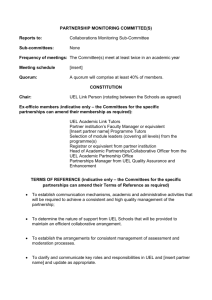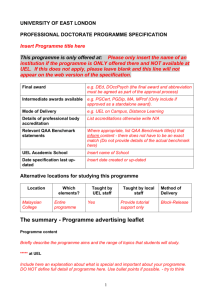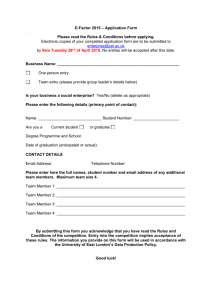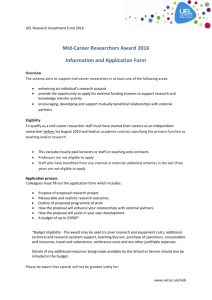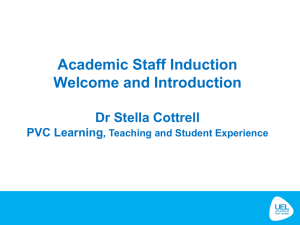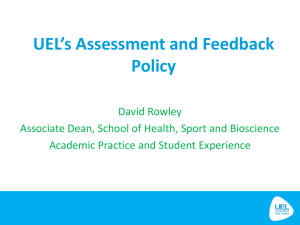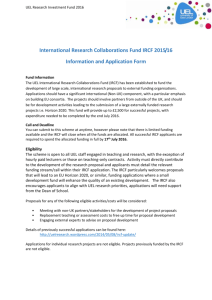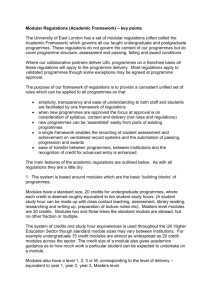Presentation 2: UEL Guidelines for External Examiners
advertisement
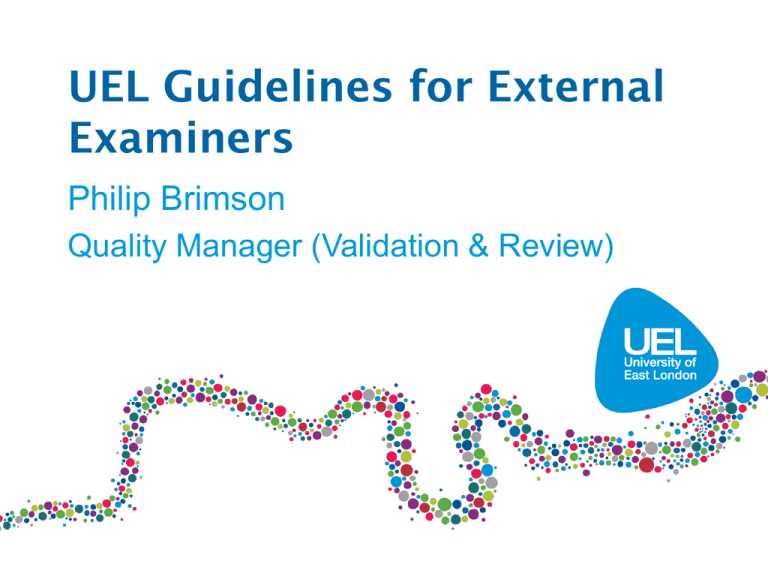
UEL Guidelines for External Examiners Philip Brimson Quality Manager (Validation & Review) The Role of the External Examiner • Verify that academic standards are appropriate • Assure and maintain academic standards • To make comparisons with similar HE programmes across the UK • Ensure that the assessment processes are sound, fairly operated and in line with our policies and regulations Ensuring Comparability of Standards • Output standard of our modules and programmes are comparable with those of similar programmes • Comparative performance with students from elsewhere with similar entry profiles Supporting our Students • • • • • • • • • Skills curriculum Student attendance policy Standardised referencing policy English language support Skillzone Skills Portal Write it Right LAMs and LAAs Campaigns Revised Assessment & Feedback Policy • Re-approved September 2014 • In response to feedback from a wide range of sources • Assessment Design • Management of Assessment • Feedback • www.uel.ac.uk/qa Approving Assessment Tasks • Every component of assessment at all levels (coursework as well as examinations) • First and second opportunity assessment at the same time • Submitted to you by the end of the semester prior to required first use • You should receive: – Assessment task – Module specification – Published assessment criteria – Clear guidance notes i.e. expectations of the task • Tasks for collaborative partners Approving Assessment Tasks • What to look for: – Tasks provide the students with the opportunity to perform at a comparable standard – Tasks enable students to meet the intended learning outcomes, and appropriate to the curriculum content – Clarity of assessment task and the guidance provided e-Submission • All appropriate, assessment should be submitted online • Exemptions for online submissions include portfolios, long dissertations, artwork etc. • The proportion of online submissions has increased gradually since 2011/12 Second and Anonymous Marking • Anonymous marking wherever the method of assessment allows • Second marking as sampling or moderation – Maintenance of standards – Eliminate arithmetic errors • A minimum of 10% or 10 individual pieces of each assessment task, which ever is the greater • Where assessment does not allow anonymous marking, all work will be second marked • Clearer and more extensive guidance provided on resolving differences between first and second markers Evaluating Assessed Work • Access to all work • Every component of assessment • Sampling: a minimum of 10% or 10 individual pieces of each assessment task, whichever is the greater • By post, electronically or on site prior to assessment board • Moderator, not a second or third marker • Samples for collaborative partners Evaluating Assessed Work • You should receive Sample of assessed work Module specification Details of assessment task(s) Assessment criteria and guidance Record of marks and comments from examiners The schedule of all marks agreed for all candidates on the module – A brief report from the module leader providing general comments on the assessment outcomes – – – – – – Moderating Marks • Right to moderate marks to secure standards or ensure fairness • EEs can recommend to the Subject Area Board that: – All marks for a particular assessment are raised or lowered – All candidate’s work be reconsidered if significant discrepancies and/or inconsistencies are revealed • Speak to the subject head in advance Module Improvement Plans • Low pass rates - modules where the pass rate at first attempt is lower than – Level 3 and 4 65% – Level 5 70% – Level 6 75% • Low average mean marks – level 5 or 6 modules where the mean mark of those students passing on their first opportunity is less than 55% External Examiners and Lead Examiners • External Examiner – Standards and performance of students on modules – Performance of students on programmes – Progression of students • Lead Examiner – Confirming awards and Standards of attainment – Award algorithms Ensuring Regulations Are Followed • Academic framework modular regulations • Support from Chair and servicing officer • Right of appeal based on non-conformance to regulations • Assessment board cannot change regulations Review of Assessment Board Decision • Right of appeal – Assessment not conducted in accordance with regulations – Non-implementation of agreed assessment procedures for student with disability or additional need • No involvement in evaluating validity of appeal • If referred back to assessment board you may be required to contribute to a review Attending Assessment Boards • Try to attend all boards • Essential that you are involved in some way – post, phone • Sign form to confirm involvement and agreement to results Remaining Impartial • You should not be – Personally associated with the sponsorship of students – Currently a member of staff teaching on a programme leading to a UEL award at a collaborative partner institution – Required to assess colleagues who are students – In a position to influence the future employment of students – Involved with UEL student placements or training of UEL students in your own organisation Your Report Annual report Part of your contract Essential part of QA processes Normally submitted after the summer assessment boards • Pay is contingent on receipt of report • • • • Overall Standards • Confirm appropriateness of standards set for the subjects or awards at this level • Confirm that standards of student performance are comparable with similar subjects in other UK Institutions with which you are familiar • Confirm that the processes for assessment, examination and the determination of awards are sound and fairly conducted UEL External Examiner Report • • • • • • • • • • The standards attained by the students The standard of modules reviewed The design and structure of the assessment The general conduct of the assessment Marking The subject area or modules Progression Decisions Previous reports Other comments Comment separately on outcomes of modules offered at collaborative partners UEL Lead Examiner Report • The standards of attainment and award • The general conduct of the assessment • Observations relating to the programmes • Previous reports • Other comments What Happens to Your Report • Quality Assurance team and Pro-Vice Chancellor read report and identify key issues in memo • Dean of School/Subject Head prepares response to you • QA and PVC read the response • Used to make improvements and ensure urgent action where necessary • Review and Enhancement Process • UEL report to identify themes and trends • Reports and response letter are accessible online to students


